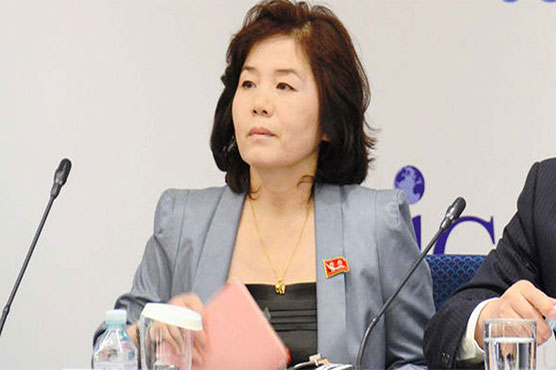North Korea says will ignore US while 'hostile policy' in place

North Korea said it will ignore all US efforts to foster contact unless Washington changes course.
SEOUL (AFP) - North Korea said Thursday it will ignore all US efforts to foster contact or dialogue unless Washington changes course, hours before President Joe Biden s top envoys held talks in Seoul.
The comments from the North s first vice foreign minister Choe Son Hui came with US Secretary of State Antony Blinken and Pentagon chief Lloyd Austin in the South for the second leg of an Asian tour to bolster a united front against the nuclear-armed North and an increasingly assertive China.
The pair have repeatedly called for the "complete denuclearisation of North Korea" on their trip, which began in Japan.
There could be no contact nor dialogue between Washington and Pyongyang "unless the US rolls back its hostile policy towards the DPRK", Choe said in a statement carried Thursday by the official Korean Central News Agency, referring to the North by its official name.
"Therefore, we will disregard such an attempt of the US in the future, too."
The "new regime" in the US, she added, had only put forward a "lunatic theory of threat from north Korea and groundless rhetoric about complete denuclearisation ".
Pyongyang has closed its borders for more than a year to try to protect itself against the coronavirus pandemic that first emerged in neighbouring China.
It had maintained silence during the first weeks of the Biden administration, with state media not even mentioning the new US leadership until this week.
Blinken s comments in Japan had "seriously rattled us", Choe added.
"We are curious what senseless rhetoric he would make in south Korea to take the world by surprise."
- No response -
The US envoys held joint talks with their counterparts Thursday and were due to meet later with President Moon Jae-in, who brokered the talks process between Kim and then US president Donald Trump in 2018.
Blinken and Austin are consulting on a review of Washington s policy towards the North being carried out by the new administration.
Trump s unorthodox approach to foreign policy saw him trade insults and threats of war with North Korean leader Kim Jong Un before an extraordinary diplomatic bromance that saw a series of headline-grabbing meetings, beginning in Singapore.
But ultimately no progress was made towards Washington s declared aim of denuclearising North Korea, with a second summit in Hanoi in early 2019 breaking up over sanctions relief and what Pyongyang would be willing to give up in return.
The North remains under multiple international sanctions for its banned weapons programmes, which it says it needs to deter a possible US invasion.
Shortly before Biden s January inauguration, leader Kim decried the US as his country s "foremost principal enemy" and Pyongyang unveiled a new submarine-launched ballistic missile at a military parade.
Choe said Thursday that for talks to take place, Pyongyang and Washington would have to meet as equals.
"We make it clear that we won t give it such opportunities as in Singapore and Hanoi again," she said.
Since mid-February, Washington has attempted to reach out to Pyongyang "through several channels", state department deputy spokesperson Jalina Porter said earlier this week.
"To date, we ve not received any response from Pyongyang," she added.
So far, the North has refrained from carrying out any direct provocations since Biden was inaugurated, but is now beginning to amplify its rhetoric.
Seoul and Washington are security allies and kicked off joint military exercises last week. That prompted the North Korean leader s influential sister Kim Yo Jong to warn the new US administration against "causing a stink at its first step" if it wants to "sleep in peace for coming four years".

